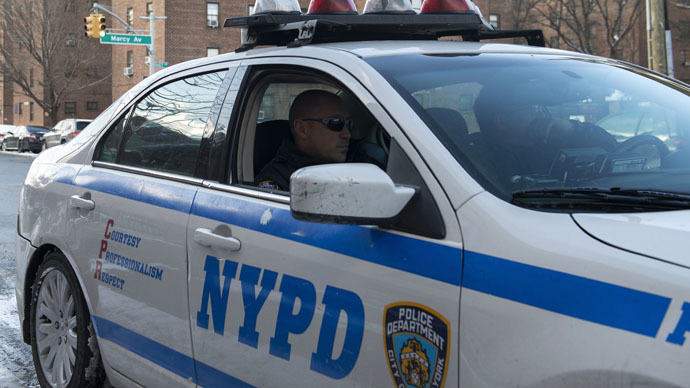NYPD arrests back up after weeks of 'slowdown' - report

A new analysis of New York Police Department activity shows that the amount of summonses issued and arrests made throughout the city last week increased following a steep decline of enforcement in the latter half of December.
According to the New York Daily News, the latest NYPD summons and arrest figures indicate the “slowdown” – much of it portrayed as a political protest against New York City Mayor Bill de Blasio over his sympathetic comments towards police-brutality protesters – has at least waned, as the 4,690 arrests made from Jan. 5 to Jan. 11 are down only 38 percent from the 7,508 arrests made in the corresponding week last year.
That 38 percent dip is an improvement from more dramatic drops in late December. For instance, overall arrests for the week of Dec. 22 were down 66 percent compared with the same period in 2013, according to statistics cited by the New York Post.
“We are still concerned with the levels of activity, but they are returning to normal,” NYPD Commissioner Bill Bratton said. “With each passing day, each passing week, those numbers are going back to what we would describe as normal levels.”
.@CommishBratton says all 5 NYC boros had reduced crime in first 12 days in 2015: during & after the #NYPDslowdown. #overpolicing
— Copwatch (@Copwatch) January 13, 2015
The reduced policing stems, according to reports, from both fear -- unions ordered that two patrol cars must respond to every call -- and animosity between Mayor de Blasio and police unions following the fatal shooting of two NYPD officers. Adding to tensions was fallout from a grand jury’s decision not to indict a white NYPD officer, Daniel Pantaleo, who was captured on video killing an unarmed black man, Eric Garner, with a chokehold for illegally selling cigarettes in Staten Island.
READ MORE: NYPD chokehold review finds weak punishment for offending officers
On Dec. 20, the day NYPD officers Rafael Ramos and Wenjian Liu were fatally shot by gunman Ismaaiyl Brinsley in Brooklyn, the Patrolmen’s Benevolent Association, a top police union in the city, purportedly sent out a mass memo telling officers to take safety first and that "absolutely NO enforcement action in the form of arrests and or summonses is to be taken unless absolutely necessary."
Meanwhile, the New York Post reported over the weekend that NYPD police precincts had been ordered to boost arrest and summons quotas or face punishment.
“Police officers around the city are now threatened with transfers, no vacation time and sick time unless they write summonses …. This is the same practice that caused officers to be labeled racist and abusers of power,” said a police union rep, according to the Post.
Yet, as the Daily News’ analysis pointed out, low-level policing was declining even before the fatal shooting of Ramos and Liu and around the time of the Staten Island grand jury decision.
According to the Daily News, a selection of crime complaints, arrests, and summonses showed that enforcement had gone down by at least 75 percent in “nearly two dozen precincts scattered about the city during the week of Dec. 15 through 21 when compared with the same week the year before.”
The week of the grand jury decision, Dec. 1 through Dec. 7, citywide arrests and summonses dropped by 55 percent compared to the same period in 2013. And, “from Dec. 8 through Dec. 14, the number of Criminal Court summonses declined 37% when compared to the previous year, while parking tickets fell 34% and arrests fell 20%,” the Daily News reported.
Some theorize that police coverage of widespread demonstrations following the grand jury decision led to a wary police force.
“We had a lot of very tired cops...who were out every night, night after night, on demonstrations,” Bratton said, according to the Daily News. “That wears on you.”
READ MORE: New Jersey Muslims take NYPD to court for monitoring their activities
Journalist Matt Taibbi told RT last week that the slowdown demonstrates how police officers -- and NYPD’s ‘broken windows’ style of policing -- are used to make up for tax shortfalls with ticket and citation revenue.
“It definitely is a revenue driver for the city, this mass regime of handing out tickets. It does strike the ear a little bit funny when you hear police union leaders talking about how we are only to going to arrest people when we ‘have to.’ It seems like that should be the real function of police generally. If they are ticketing and arresting people when they don’t have to, then something’s up, and that’s not right.”
Taibbi added that “‘broken windows,' is kind of like commercial fishing. Basically what you do is throw a net over a whole neighborhood; you pull in everybody for every tiny, small thing; and then the idea is to get people who have guns or warrants, and then you throw everybody else back. It is an effective strategy to a degree, but it creates a lot of hostility in the target neighborhoods.”
Guess the #NYPDSlowdown doesn't affect intimidating free speech. MT @KeeganNYC: show of force at #GrandCentral now pic.twitter.com/qUbGt1oSEy
— Occupy Wall Street (@OccupyWallStNYC) January 12, 2015
Yet, according to Bratton, lower crime figures were a result of police policies like broken windows, not because of the ineffectiveness of the programs.
“Broken windows is here to stay. Stop, question and frisk is here to stay,” Bratton said last week. “But it will be done in appropriate amounts. So, even the broken windows policing – we are very selective in terms of looking at areas where we can reduce the need for that. Marijuana arrests is clearly one of those. We took a close look at marijuana arrests and felt it was not an appropriate use of our resources. It was costing us a fortune, in terms of manpower, over time.”












